- Joined
- Jun 27, 2018
- Messages
- 30,097
- Points
- 113
I hope this helps the victims...but the biggest question/elephant in the room that no one mentions is why is all properties built not sound proof of sound insulated?New govt unit to investigate severe neighbour disputes, could deploy noise sensors under proposed law
The Community Relations Unit can investigate and take action in severe cases after earlier intervention efforts are exhausted.
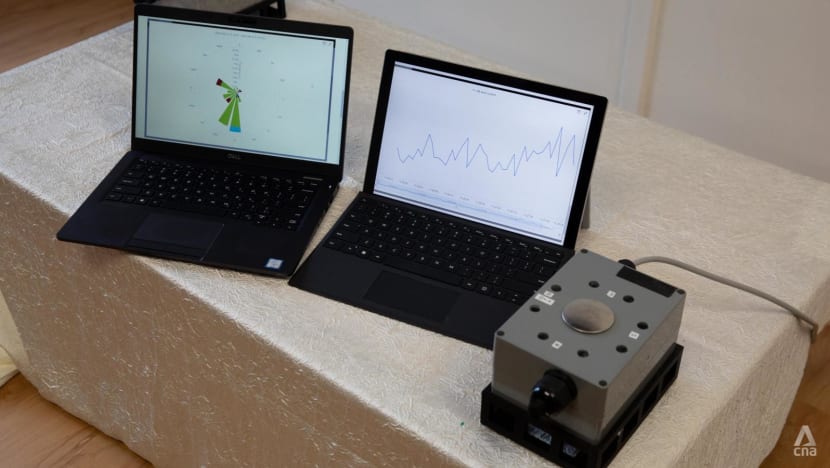
The noise sensor and the data it captures in charts during a demonstration on Aug 12, 2024. The charts show the direction and intensity of the noise. (Photo: CNA/Ili Nadhirah Mansor)
Koh Wan Ting
12 Aug 2024 02:45PM (Updated: 12 Aug 2024 04:09PM)
SINGAPORE: A new government unit with the power to investigate severe neighbour noise disputes, including the ability to deploy noise sensors, is expected to operate after a Bill is passed, as part of efforts to bring about resolutions in such disputes, three ministries announced on Monday (Aug 12).
The Community Relations Unit (CRU) can investigate and take action in severe cases of neighbour disputes involving noise and hoarding, the Ministry of Law, the Ministry of Culture, Community and Youth, and the Ministry of National Development said.
The new arm is part of enhancements to the Community Disputes Management Framework (CDMF), which was set up in 2014 to help with neighbour disputes.
Enhancements to the CDMF will be introduced in parliament through the Community Disputes Resolution (Amendment) Bill, which will undergo its first reading later this year.
The three ministries conducted a public consultation and focus group discussions for CDMF from May last year to ask for feedback on community building and neighbour disputes.
They said most respondents expected the government to exercise greater authority to intervene in a minority of "particularly severe" cases. These include those who use noise as a way to disturb their neighbours, with earlier attempts at dialogue and reaching a resolution proving unsuccessful.
ONE-YEAR PILOT STARTING WITH TAMPINES
Mr Yap Yeow Chern, a senior director of operations in the Municipal Services Office (MSO), said that having investigation powers will help the CRU in its work.
"When we're actually investigating the very small subset of severe cases, we found that sometimes the residents will evade us," he added.
"So in cases where the frontline agencies visit a suspected unit, the noise dies down miraculously, and then when the agencies leave, subsequently, the noise comes back again."
Without investigation powers that compel people to attend interviews or to record a statement, the authorities would be unable to take "the next step", Mr Yap said.
After the Bill is passed, the CRU - which currently has 15 staff members - will be piloted for a year in the Housing Board estates of one to two towns, starting with Tampines. The ministries said Tampines had an "average caseload" compared to other towns.
The authorities will then review the CRU and assess how it can be sustainably scaled up.
Staffed by community relations officers (CROs), the unit will also be supported by auxiliary police officers. CROs will be given investigation and enforcement powers to intervene in severe noise-related disputes.
They will be able to:
- Take statements from involved parties
- Enter a residence to gather evidence - with the consent of the owner, occupier, or with approval from the director-general of community relations
- Issue a mediation direction to require the neighbours concerned to attend mediation, if the case is found suitable for mediation
- Issue advisories, warnings or abatement orders that require the individual to take reasonable steps to stop the noise nuisance
- Require the removal of the nuisance-causing object, after sufficient warning and with authorisation from the director-general
"I need to emphasise that the CRU is only a part of, and not a substitute for, neighbors building bonds, neighbours coming together early, neighbours talking frequently, as well as community norms and mediation," said Mr Yap.
"The CRU therefore must not function as the first resort. Having the government step in all the time to resolve neighbor disputes is neither sustainable, nor is it desirable for our community spirit."
NOISE SENSORS TO BE DEPLOYED
Mr Yap said that feedback on neighbour noise rose sharply during the COVID-19 pandemic and has not returned to pre-pandemic levels.
The authorities received 2,160 cases of such feedback per month in the first half of this year. However, most disputes are resolved with "good neighbourly communication and informal mediation", Mr Yap noted.
Around 90 per cent of cases are resolved with earlier intervention, with the remaining 10 per cent proving more more challenging. Only a portion of these challenging cases will require noise sensors, such as if the source of commotion is disputed.
The CRU will use noise sensors to collect objective evidence on the direction, timing and intensity of the noise.
The noise sensor that will be used for any disputes among neighbours, on Aug 12, 2024. (Photo: CNA/Ili Nadhirah Mansor)
"This addresses the current gap where sound recordings made by complainants are often not useful for the purposes of determining the volume (as playback can be distorted) or source of noise," the three ministries said in a press release.
The sensor is optional and will only be located in a residence with the consent of the occupier or owner. It can also be deployed in shared areas, like the common corridors, with the consent of managing agents.
Mr Yap said that noise sensors will only be placed in the complainants' homes, rather than the residence where the noise comes from.
"The reason why we do that is because if you are a complainant, we want to capture your lived experience, how bad is the sound affecting you?" he added.
"If I deploy it in the nuisance-maker's (house), it doesn't tell me how badly the (complainant) is affected. It can tell me how loud the guy is ... But that does not tell me whether everyone else is affected."
When the noise sensor is deployed in common areas, a sign will be placed to inform the public of its function.
HOW THE NOISE SENSOR WORKS
The ministries gave a demonstration of how the device picks up sounds.
Eight microphones located on the sensor can pinpoint the direction of the noise, while a non-directional microphone detects the intensity of the noise.
After the device records the sound, the recording will be sent to Singapore-based servers for data processing in the form of two charts.
A CNA journalist creating noise during a demonstration of how the noise sensor works at the Ministry of National Development building on Aug 12, 2024. (GIF: CNA/Ili Nadhirah Mansor)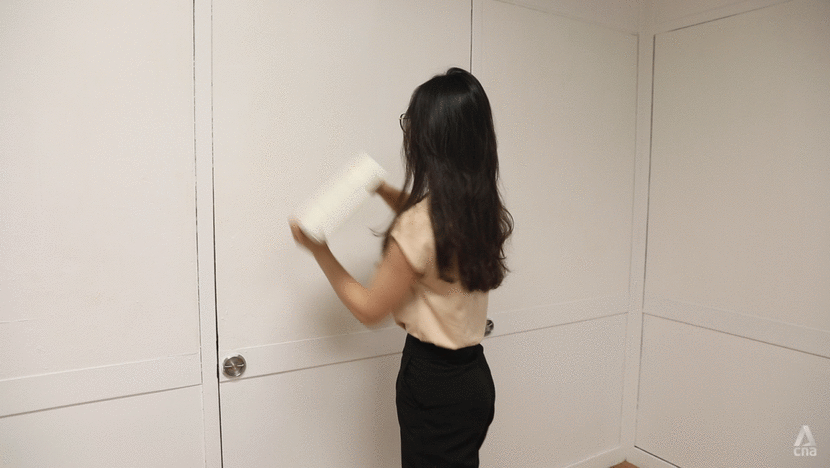
One chart, in the form of a line graph, will depict the intensity of the noise above an ambient baseline over time.
The other chart, which resembles a pie chart, will detail the direction of the noise through the eight directional microphones. The chart will also capture the level of noise produced.
To safeguard privacy, the recording will then be expunged immediately, and no person will have access to the recording and its content.
The sensor will be deployed between three to seven days.
Noise sensors will complement officers' efforts after initial investigations have narrowed down its source and neighbours have provided their feedback, and have had the opportunity to resolve the issue amicably.
COMPULSORY MEDIATION
As part of enhancement, the authorities will also encourage greater use of community mediation to resolve neighbour disputes at an early stage.
Authorised agencies may direct parties to attend mediation at the Community Mediation Centre (CMC) to resolve neighbour disputes.
The CMC has also set up more satellite mediation venues at selected community clubs and Service SG centres to improve access to mediation.
Currently, about 80 per cent of voluntary mediation cases mediated by the CMC are successfully settled, according to the ministries. However, less than 30 per cent of total cases registered actually proceed to mediation because one party refuses to.
"With a bit of a nudge, we can encourage more people to go for mediation, which is why a key plank of the amendments is mandatory mediation or directed mediation," Mr Yap said.
Agencies such as the CRU and CMC will be empowered to direct disputing neighbours to attend mediation at the CMC by issuing a mediation direction.
The mediation direction framework will be piloted together with the CRU to resolve suitable disputes over noise.
ENHANCING POWERS OF CDRT
The Community Disputes Resolution Tribunals (CDRT), which is the avenue of last resort for complainants after mediation and other earlier interventions have failed, will have new powers to make certain orders for quicker and more effective resolution of cases.
CRU's fact-finding process will be integrated with the CDRT process, empowering the tribunal to make interim orders and mandatory treatment orders. A mandatory treatment order directs a person suffering from certain treatable psychiatric conditions to undergo psychiatric treatment.
For severe hoarding cases, the CRU can apply for a CDRT order to declutter a residential unit.
This will come after the tribunal is satisfied that the hoarding has caused unreasonable interference to the hoarder’s neighbour and the hoarder has not complied with an initial CDRT order to declutter.
The ministries stressed that regular communication between neighbours should come first.
"Good neighbours should come together early and often. Such ties go a long way to building social capital that can weather everyday frictions," the ministries said.
"For the minority of cases that cannot be resolved via community self-help, the enhanced CDMF will provide a wider range of options to facilitate effective resolution of neighbour disputes."
Knocking sounds in Choa Chu Kang flat plague woman for 4 years, her family resorts to sleeping in living room
The woman said she turns the radio on all day to cancel out the noise.Winnie Li |
August 13, 2024, 03:27 AM
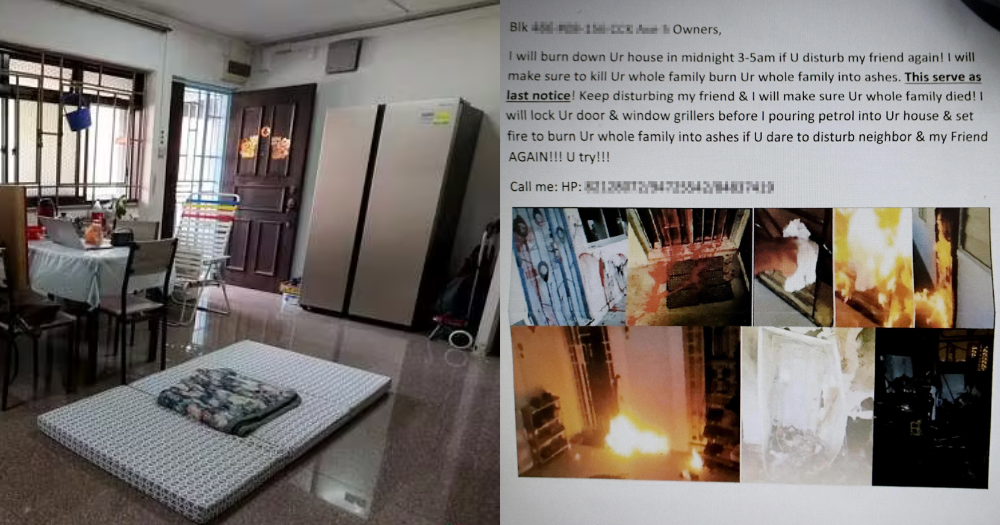


A 41-year-old woman and her parents were forced to sleep in the living room of their Housing and Development Board (HDB) flat at Block 486 Choa Chu Kang Avenue 5 after they kept hearing knocking sounds supposedly coming from the unit upstairs.
However, when the woman, surnamed Su (transliteration), confronted two neighbours directly above her flat on the suspicion that they were the ones generating the noise, both of them denied any responsibility, reported Shin Min Daily News.
"We alerted the police about the noise and wanted to solve it by collecting evidence and going to court. However, we couldn't proceed further because we could not pinpoint who has been making the noise," Su lamented.
First heard knocking sounds in 2020
According to Su, who has lived with her parents at the HDB block for 20 years, their ordeal started four years ago when tenants living upstairs began moving in, reported Shin Min."I did not know how many times the tenants changed, but almost every one of them would generate noise, making it impossible for us to rest," Su said.
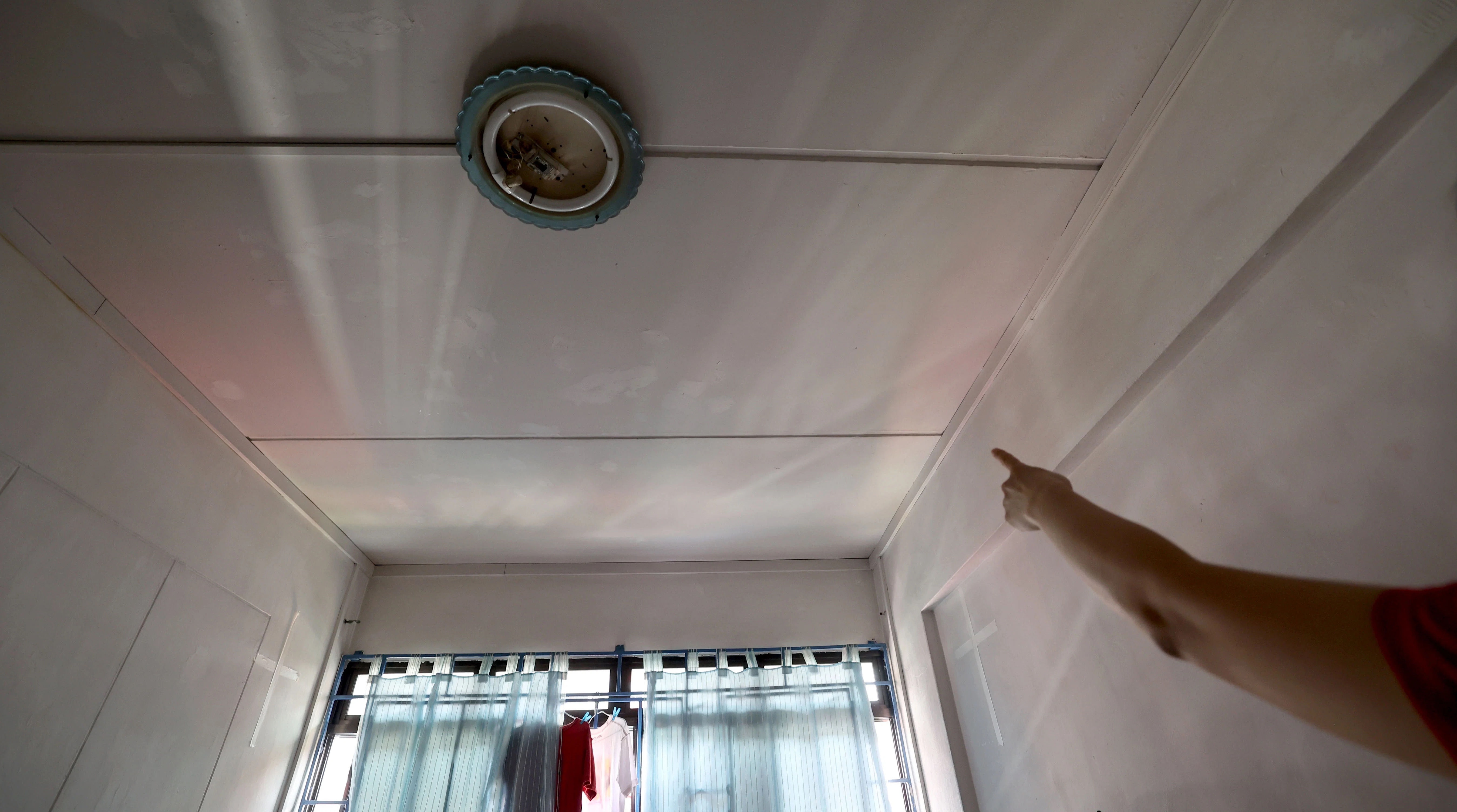
Su shared that the noise resembled the sound of knocking on floor tiles, and her family would hear it almost every day from 9am to 11am.
The sounds would also be heard suddenly at night between 10pm and 1am, she added.
Turned radio on all day
In 2023, Su decided to place a radio in her room, which has been left on for 24 hours a day to cancel out part of the noise, reported Shin Min."My family would rather listen to the radio all day long than be startled by the noise," shared Su.
As Su and her family could hear the noise in their rooms at night, they were forced to sleep on the sofa bed and mattress in the living room.
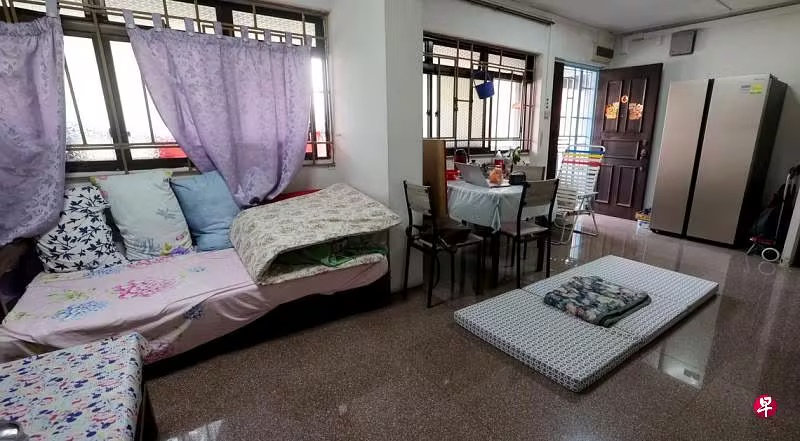
Su got graphic "warning letter" after complaining about noise
Over the years, Su raised the matter with several neighbours upstairs, including a tenant who is French, reported Shin Min.According to her, she began to hear knocking sounds after the tenant moved in.
However, soon after the tenant moved out in 2020, Su said she received two letters warning her that if she ever "disturbed" her neighbours or the letter sender's friend again, the letter sender would "burn down" her house.
In one letter Su kept, photos of burning flats and corpses were attached.
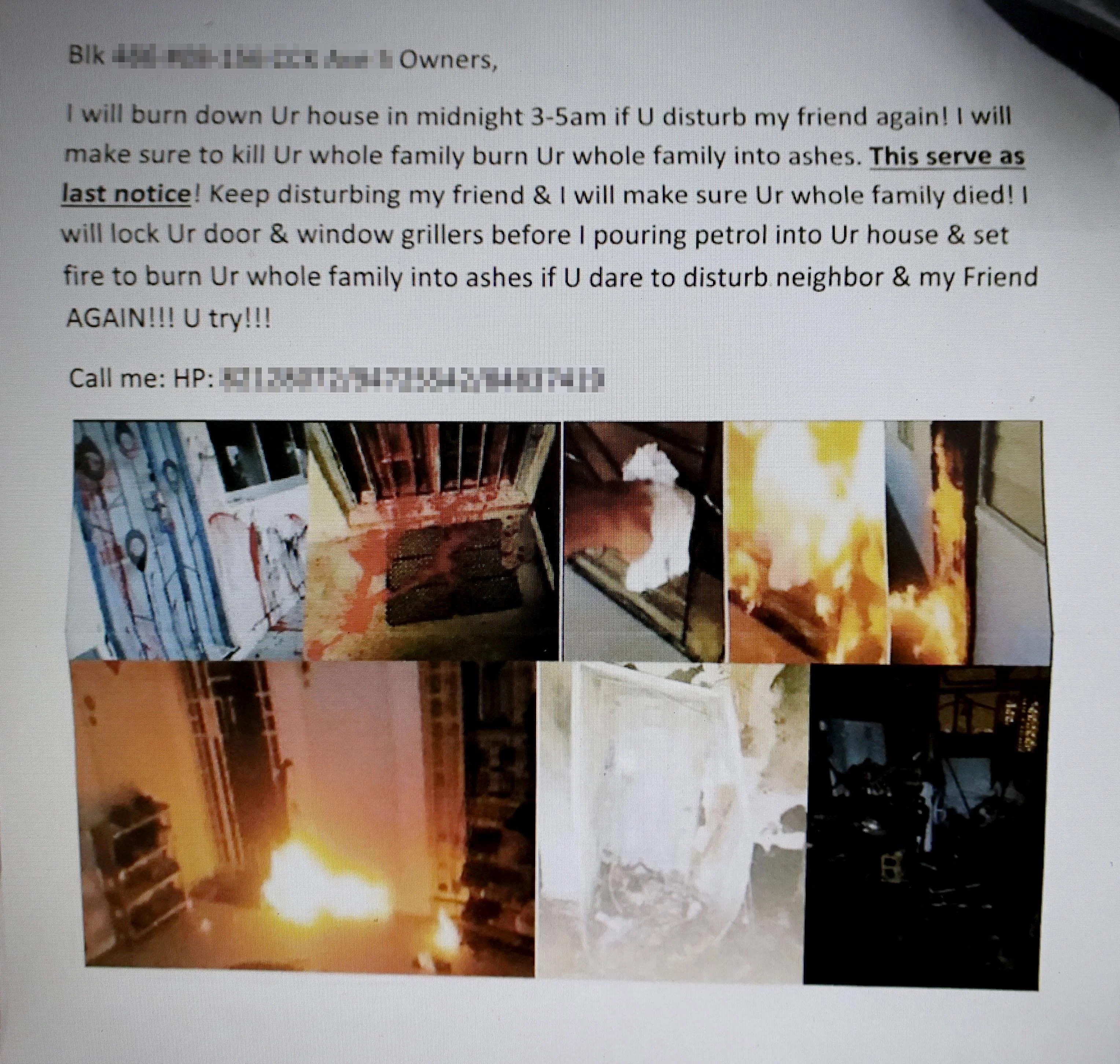
Su said she suspected that the previous tenant sent her those letters to get back at her for complaining about the noise, according to Shin Min.
Current neighbour upstairs also heard knocking sounds
When a Shin Min reporter visited Su's neighbour upstairs, Rajesh (tansliteration), who moved in six months ago, he also denied that he was behind the knocking sounds.He said he was aware of Su's numerous complaints, adding that she had also complained to him about the noise he made, which sounded like he was dragging his chair.
"We did not make those knocking sounds. In fact, I heard those sounds in my flat from time to time as well, but I do not know where they came from," said Rajesh.
New government unit to address noise disputes
According to the Ministry of National Development (MND), HDB received 2,150 noise complaints monthly in 2023, reported The Straits Times.While this is fewer than the number of noise complaints HDB received monthly in 2021 and 2022, which was 3,200 and 2,300, respectively, it was still much higher than the monthly average of 400 the board received in 2019.
On Aug. 12, 2024, the Ministry of Culture, Community, and Youth (MCCY), Ministry of Law, and MND announced that the government is looking to pilot a new Community Relations Unit (CRU) to address a small minority of severe neighbour noise disputes after the Community Disputes Resolution (Amendment) Bill is passed.
The CRU will be staffed by Community Relations Officers (CROs), who, amongst others, will be able to issue advisories, warnings, or abatement orders that require the individual to take reasonable steps to stop the noise nuisance.
Additionally, the CRU will be empowered to deploy noise sensors to collect objective evidence on the direction, timing, and intensity of the noise.
According to the ministries, the pilot will run for a year in the HDB estates of one to two towns, starting with Tampines.
More information on the pilot can be found here.
Other noise complaints
Top images via Shin Min Daily News
If you like what you read, follow us on Facebook, Instagram, Twitter and Telegram to get the latest updates.
You Might Also Like

